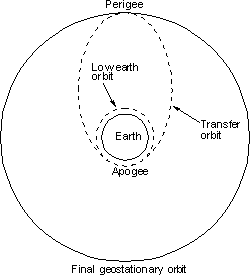Methods used to place a satellite into orbit
Satellite Orbits Includes:
Satellite orbit types & definitions
Low earth orbit, LEO
Geostationary orbit, GEO
Highly elliptical orbit HEO
Techniques for launching satellites into orbit
There is a considerable amount of expertise and technology used to ensure that satellites enter their orbits in the most energy efficient ways possible. This ensures that the amount of fuel required is kept to a minimum; an important factor on its own because the fuel itself has to be transported until it is used. If too much fuel has to be used then this increases the size of the launch rocket and in turn this greatly increases the costs.
Many satellites are placed into geostationary orbit, and one common method of achieving this is based on the Hohmann transfer principle. This is the method use when the Shuttle launches satellites into orbit. Using this system the satellite is placed into a low earth orbit with an altitude of around 180 miles. Once in the correct position in this orbit rockets are fired to put the satellite into an elliptical orbit with the perigee at the low earth orbit and the apogee at the geostationary orbit as shown. When the satellite reaches the final altitude the rocket or booster is again fired to retain it in the geostationary orbit with the correct velocity.

Alternatively when launch vehicles like Ariane are used the satellite is launched directly into the elliptical transfer orbit. Again when the satellite is at the required altitude the rockets are fired to transfer it into the required orbit with the correct velocity.
These are the two main methods of placing satellites into orbit. Naturally it would be possible to place a satellite directly into geostationary orbit, but this would take more energy and would not be feasible.

Image courtesy NASA
 Written by Ian Poole .
Written by Ian Poole .
Experienced electronics engineer and author.
More Essential Satellite Topics:
Interesting facts about satellites
Satellite orbits
Solar outage
Return to Satellite topics menu . . .




